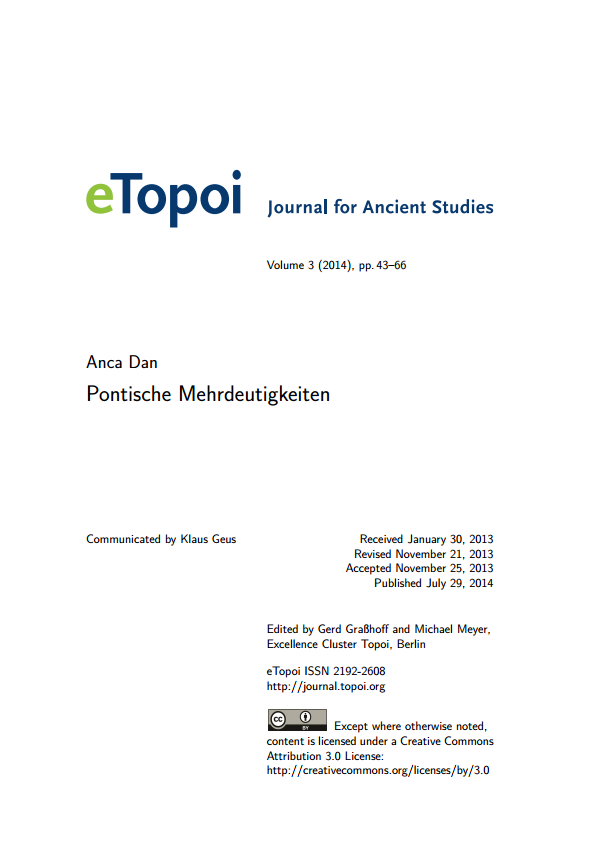Pontische Mehrdeutigkeiten
One of the Greek words for ‚sea”, ‚πόντος” (which means both ‚crossing” and ‚difficulty”) was used for the sea par excellence, the Euxine Pontus, since Archaic times. The name first described the south-eastern Black Sea region, then the kingdom of Mithridates Eupator and finally the Roman provinces of Pontus. Despite the clear chronology in the use of the name Pontus for the above mentioned regions, several inscriptions appear ambiguous. A ‚Pontian” referred to in an inscription from 4th century BC Athens could neither have belonged to a ‚Pontic” people nor to the realm of Mithridates. Also, a ‚Pontian” woman of the 2nd century BC could have come from northeastern Asia Minor, Herakleia or another Black Sea city. A young man, who died in Rome between the 2nd and 3rd century AD, came from the Pontic province, but his gravestone, which presents him as a countryman of the Homeric hero Achilles, casts doubts about his precise place of origin, in the Black Sea region. In all these cases, the adjective ‚Pontic” was used for stylistic reasons; it indicates an indistinct geographical identity, connected with the Black Sea, but also hints at certain religious allusions—both maritime and erotic.
Eines der griechischen Wörter für ‚Meer”, ‚πόντος” (das zugleich ‚Kreuzen” und ‚Schwierigkeit”bedeutet), wurde seit archaischer Zeit für das Meer par excellence, den Pontos Euxeinos, verwendet. Von diesem Raum aus ging der Name zuerst auf die südöstliche Küste des Schwarzen Meeres und dann auf das Territorium des Reiches Mithridates Eupators und die römischen Provinzen Pontus über. Trotz dieser eindeutigen Chronologie bei der Verwendung des Namens Pontus für die genannten geographischen Gebiete weisen einige Inschriften Mehrdeutigkeiten auf. Eine als ‚Pontier” im Athen des 4. Jahrhunderts v. Chr. bezeichnete Person kann weder zu einem ‚pontischen” Volk noch zum Gebiet des mithridatischen Reiches gehört haben. Auch konnte eine ‚pontische” Frau des 2. Jahrhunderts v. Chr. aus dem Nordosten Kleinasiens oder aus Herakleia oder einer anderen Stadt des Schwarzen Meeres kommen. Ein junger Mann, gestorben in Rom zwischen dem 2. und dem 3. Jahrhundert, kam zwar aus der pontischen Provinz, aber sein Grabstein, der ihn als Landsmann des homerischen Helden Achilles darstellt, weckt Zweifelt an seiner Herkunft aus dem Schwarzmeerraum. In allen genannten Fällen ist das poetisch eingesetzte Adjektiv ‚pontisch” nicht nur als Hinweis auf eine unscharfe geographische Identität zu verstehen sondern beinhaltet darüber hinaus deutliche religiöse – maritime und erotische – Anspielungen.

